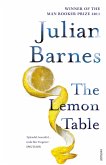Jede Erzählung dieses Bandes steht für sich, doch sind alle durch das Thema miteinander verbunden - das Altern. Ob die Erzählungen nun im 19. Jahrhundert oder in unserer Zeit spielen, die Menschen nähern sich dem Ende ihres Lebens, dem Ende, das sich in besonderen Erfahrungen und oft irrwitzigen Situationen ankündigt. Sie gehen damit gelassen um oder aufbegehrend, resigniert oder bitter. Die Zitrone, erfährt der Leser in der letzten Erzählung "Stille", ist für die Chinesen das Symbol des Todes. In dieser Erzählung über den ausgebrannten Komponisten Sibelius treffen sich die alten Männer an einem (nicht Stamm-, sondern) Zitronentisch, um über ihr Ende zu sprechen: "Kopf hoch! Der Tod ist nicht mehr fern."
In his widely acclaimed new collection of stories, Julian Barnes addresses what is perhaps the most poignant aspect of the human condition: growing old.
The characters in The Lemon Table are facing the ends of their lives-some with bitter regret, others with resignation, and others still with defiant rage. Their circumstances are just as varied as their responses. In 19th-century Sweden, three brief conversations provide the basis for a lifetime of longing. In today's England, a retired army major heads into the city for his regimental dinner-and his annual appointment with a professional lady named Babs. Somewhere nearby, a devoted wife calms (or perhaps torments) her ailing husband by reading him recipes.
In stories brimming with life and our desire to hang on to it one way or another, Barnes proves himself by turns wise, funny, clever, and profound-a writer of astonishing powers of empathy and invention.
Hinweis: Dieser Artikel kann nur an eine deutsche Lieferadresse ausgeliefert werden.
In his widely acclaimed new collection of stories, Julian Barnes addresses what is perhaps the most poignant aspect of the human condition: growing old.
The characters in The Lemon Table are facing the ends of their lives-some with bitter regret, others with resignation, and others still with defiant rage. Their circumstances are just as varied as their responses. In 19th-century Sweden, three brief conversations provide the basis for a lifetime of longing. In today's England, a retired army major heads into the city for his regimental dinner-and his annual appointment with a professional lady named Babs. Somewhere nearby, a devoted wife calms (or perhaps torments) her ailing husband by reading him recipes.
In stories brimming with life and our desire to hang on to it one way or another, Barnes proves himself by turns wise, funny, clever, and profound-a writer of astonishing powers of empathy and invention.
Hinweis: Dieser Artikel kann nur an eine deutsche Lieferadresse ausgeliefert werden.








